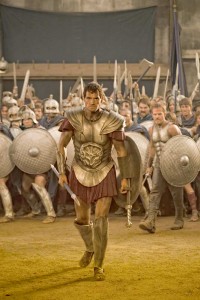Hollywood upholds erratic relationship with mythology
Sometimes you want a movie with a side of epic. The scale doesn’t get much grander than mythology, where gods and heroes battle for the fate of the world, and running off with another guy’s wife can bring down the wrath of Olympus. As such, American film and mythology seem like they would be Cupid-stricken lovers. But American film has proven an erratic partner and has crafted its fair share of epic bombs.

Mighty mortal · Henry Cavill plays Theseus in Hollywood’s latest mythological adaptation Immortals, which features a heroic quest to topple the megalomaniac King Hyperion’s reign. - Photo courtesy of EPK.TV
Immortals, opening this weekend, is Hollywood’s most recent jaunt into the days of Homer. Starring Henry Cavill and Mickey Rourke, Immortals follows the Greek hero Theseus, chosen by Zeus to take down the megalomaniac King Hyperion. Early reviews are scarce, but so far Immortals looks like the lovechild of 300 and the original Clash of the Titans (1981).
Virtually all stories have their roots in mythology. The Godfather invokes the succession myth, which played out in Greek mythology with Zeus, who became king after he vanquished his father Kronos, who had overthrown his own father, the sky god Ouranus. And the Coen brothers’ O Brother, Where Art Thou? is a modern retelling of The Odyssey.
Yet actual myths — anything from Greek to Norse to Breton, have all appeared on the silver screen. Some are grand. Others are grotesque.
Greek mythology films were most common in Hollywood between the late ’50s and ’80s. 1963’s Jason and the Argonauts and the original Clash were so earnestly sword-and-sandal, audiences could not help but be charmed. Jason quests for the Golden Fleece and fights everything from harpies to the Hydra. In Clash of the Titans, Perseus manhandles witches and slaughters Medusa.
Norse mythology has manifested in spirit more than actual retelling. For example, the summer blockbuster Thor, adapted from the comic book, is less of a myth and more of a mythology-inspired superhero story. Nicolas Winding Refn’s Valhalla Rising, however, takes the themes from Norse mythology and crafts a savage war song when a grizzled, one-eyed Norse warrior encounters Christians heading to Jerusalem.
Cinema also embraces the Breton myth of King Arthur. Who can deny a story of knights, witchcraft, incest and adultery? Two of the best adaptations are wildly different. Excalibur, despite its ’80s hokeyness, conveys the story’s inherit tragedy, serenaded by Richard Wagner and Carl Orff. Monty Python and the Holy Grail is bereft of all tragedy but brilliantly satiric, with parodies such as the Killer Rabbit channeling the Questing Beast.
Yet, sometimes Hollywood seems to think it can one-up Homer and Virgil. Studios have had a recent proclivity for taking out the magic and making myths quasi-historical and edgy. This is undoubtedly inspired by historical films cast with a mythic sheen like 300. Though it is unlikely Leonidas had to face down mutant rhinos and demonic Persians, the 300 curb-stomped the box office.
But the door does not swing both ways. Ridley Scott’s Robin Hood (2010) and Antoine Fuqua’s King Arthur (2004), upped the medieval squalor and downplayed the folklore. Both movies were also critical bombs that suffered from shoddy screenwriting and dull, studio-injected stories.
One of the only films to nearly escape this cinematic Tartarus is 2004’s Troy, which retells the Trojan War with fewer gods and more abs. Brad Pitt and Eric Bana nail their roles as Achilles and Hector, but the film stumbles over a subpar script and an utter lack of chemistry between Paris and Helen. Not to mention the real Trojan War most likely arose from trade and tariff spats, not a home-wrecking stud muffin.
That’s not to say magical mythology films are always good. The recent 3-D remake of Clash of the Titans had a distinct shortage of fight scenes, titans and character development.
A sadder failure was Robert Zemeckis’s 2007 Beowulf. Writers Neil Gaiman and Roger Avary had some interesting twists on the epic poem — Grendel’s demon mother seduces King Hrothgar to produce Grendel, the murderous beast Hrothgar needs Beowulf to destroy. When Beowulf finds the demoness’ cave, the grappling in the poem becomes a tussle of a different nature. Though British literature teachers might groan, it was an interesting idea. Unfortunately, it was hamstringed by Zemeckis’s zombie-eyed, lumbering stop-motion characters.
Mythology, spanning cultures and millennia, keeps our archetypes and primordial stories alive. There is something satisfying about myths — the depravity of some stories and the valiance in others, the larger-than-life characters who still have glimmers of intriguing humanity. Film, as unreliable of a medium as it can be, is just another way to keep old stories alive. If Immortals turns out to be a dud, at least viewers can play God of War to quench his or her mythology fix.
Mimi Honeycutt is a senior majoring in print and digital journalism. Her column “Cut to Frame” runs Fridays.

Nice mentions of movies inspired by mythology! These movies are good, however the story based from mytholog/ies are modified and sometimes, changed at all for the sake of the movies.